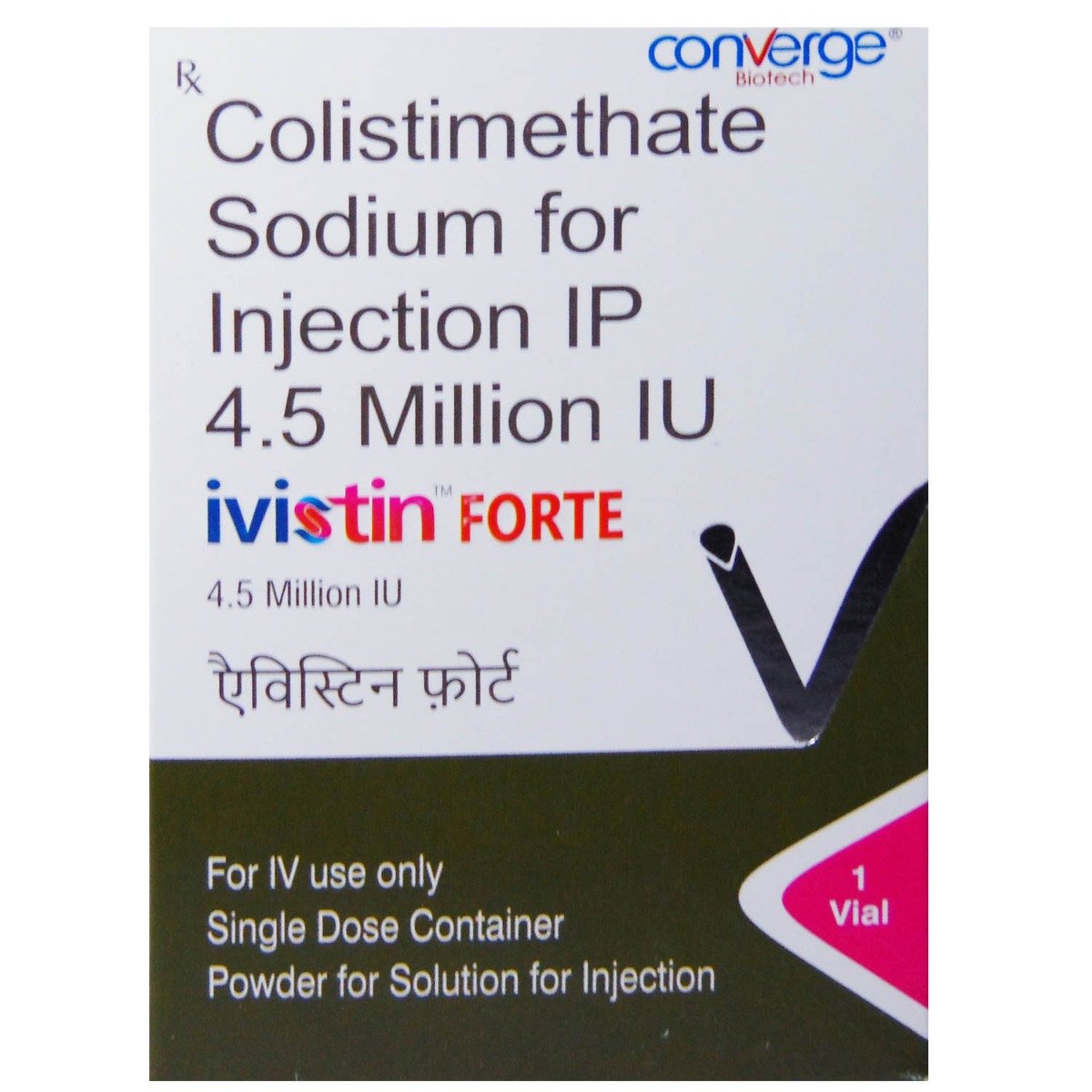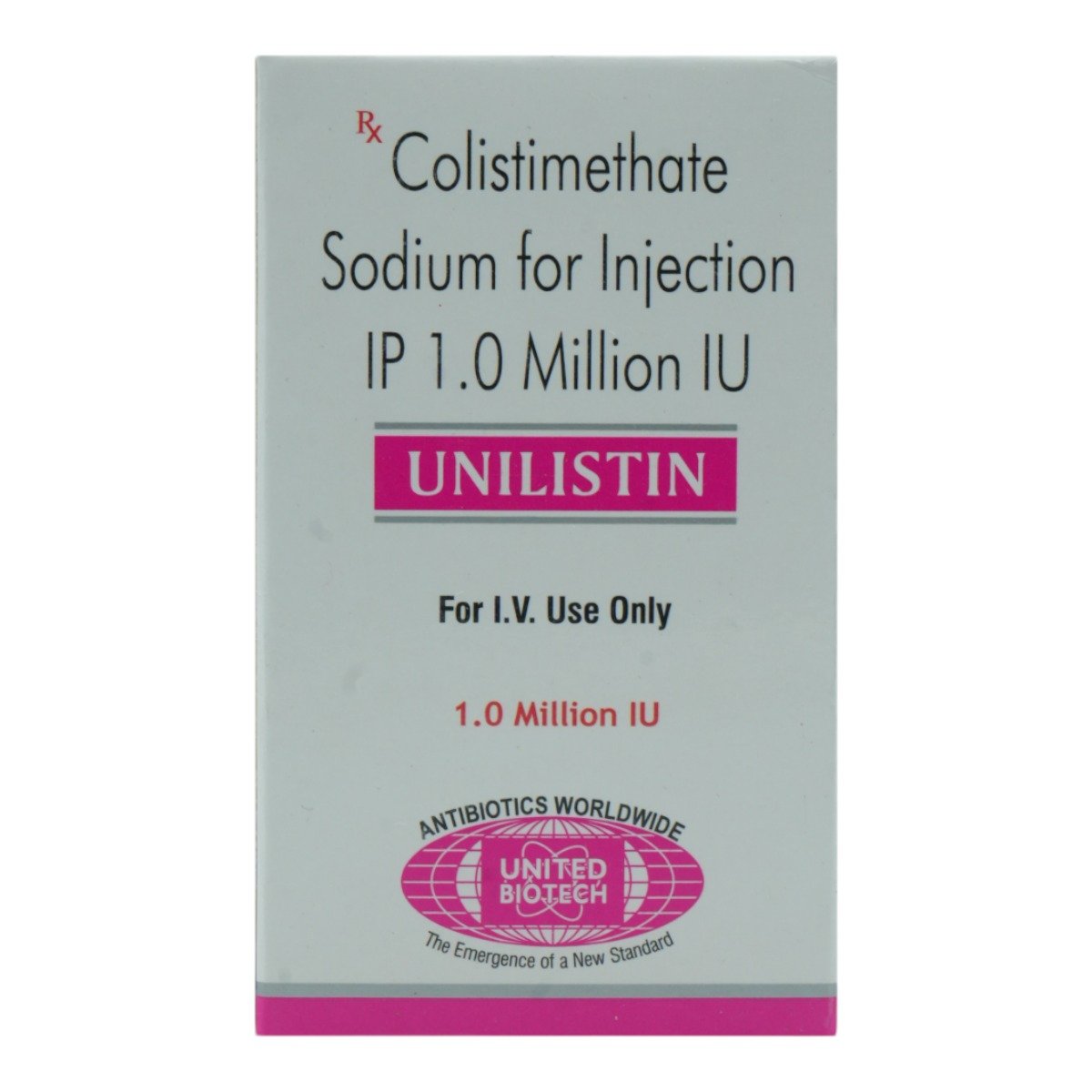Colistimethate Sodium
About Colistimethate Sodium
Colistimethate Sodium belongs to the class of medications called ‘antibiotics’ used to treat bacterial infections. Bacterial infections are caused by the multiplication of harmful bacteria inside or on the body. These harmful bacteria produce chemicals known as toxins, which can damage tissue and make you sick. Symptoms of bacterial infection vary depending on the organ affected by bacteria.
Colistimethate Sodium contains Colistimethate Sodium. Colistimethate Sodium effectively solubilizes the bacterial cell membrane, resulting in bacterial cell death. As a result, Colistimethate Sodium destroys the bacteria and successfully treats the infection.
Colistimethate Sodium will be administered by a qualified healthcare professional. Sometimes, you may experience common side effects like injection site reactions, renal damage, visual disturbances, GI disturbances, dizziness, nausea, vomiting and muscle weakness. But these side effects are usually in the initial phase and resolve over time. However, if these side effects persist, let your doctor know.
Before receiving Colistimethate Sodium, let your doctor know about all your medical conditions, sensitivities, and all medications you are using. And also, inform your doctor if you are pregnant, planning pregnancy, or breastfeeding. Colistimethate Sodium can cause blurred vision and dizziness in some people; if this occurs, do not drive or operate tools or machinery. It is recommended not to consume any alcoholic beverages while on treatment with this medicine.
Uses of Colistimethate Sodium
Medicinal Benefits
Colistimethate Sodium contains Colistimethate Sodium. Colistimethate Sodium, also known as polymyxin E, is an antibiotic medication used as a last-resort treatment for multidrug-resistant Gram-negative infections. Colistimethate Sodium essentially solubilizes the bacterial cell membrane, resulting in bacterial cell death. As a result, Colistimethate Sodium kills the bacteria and effectively treats the infection. In addition, it can also treat infectious diarrhoea and urinary tract infections.
Directions for Use
Storage
Side Effects of Colistimethate Sodium
- Superinfection (reinfection)
- Renal damage
- Visual disturbances
- GI disturbances
- Dizziness
- Nausea
- Vomiting
- Confusion
- Peripheral neuropathy
- Respiratory insufficiency
- Muscle weakness
Drug Warnings
If you are allergic to Colistimethate Sodium, please inform your physician. Inform your doctor about your medical history and other medications you are currently taking to rule out any potential negative effects. Inform your doctor if you are pregnant, planning to become pregnant, or are breastfeeding before receiving Colistimethate Sodium. Also, inform your doctor if you have chronic kidney disease, myasthenia gravis (muscle disorder), and porphyria (a blood disorder). Do not abruptly discontinue taking the prescription since this may result in antibiotic resistance, a condition in which bacteria develop resistance to antibiotics.
Drug Interactions
Drug-Drug Interactions: Colistimethate Sodium is known to interact with selective skeletal muscle relaxants (e.g. cyclobenzaprine, metaxalone), antifungals (e.g. amphotericin B) and aminoglycosides (e.g. capreomycin, vancomycin)
Drug-Food Interactions: Colistimethate Sodium is known to interact with alcohol and Grapefruit.
Drug-Disease Interactions: Colistimethate Sodium is known to interact with disease conditions, including kidney problems, myasthenia gravis (a muscle disorder), and porphyria (a blood disorder).
Drug-Drug Interactions Checker List:
Safety Advice

Alcohol
cautionLimit alcohol consumption while on treatment with this medicine as it may worsen drowsiness, dizziness or sleepiness.

Pregnancy
cautionColistimethate Sodium should not be used in pregnancy unless necessary. Hence, inform your doctor if you are pregnant or suspect pregnancy. Your doctor will weigh the benefits and potential risks before prescribing Colistimethate Sodium.

Breast Feeding
cautionColistimethate Sodium should not be used in nursing mothers unless necessary. So, inform your doctor if you are a breastfeeding mother. Your doctor will weigh the benefits and potential risks before prescribing Colistimethate Sodium.

Driving
cautionYou may have side effects like visual disturbances and dizziness after taking Colistimethate Sodium that may make you unfit to drive or operate machinery. Hence, do not drive or operate machinery until you are feeling well.

Liver
safe if prescribedInform your doctor before receiving Colistimethate Sodium if you have a liver impairment/disorder history. Your doctor may adjust the dose or prescribe a suitable alternative based on your condition.

Kidney
cautionCaution should be exercised while using Colistimethate Sodium in patients with severe kidney disease. Inform your doctor before receiving Colistimethate Sodium if you have a kidney impairment/disorder history. Your doctor may adjust the dose or prescribe a suitable alternative based on your condition.

Children
consult your doctorPlease consult your doctor. Your doctor will decide the dose of this medicine based on the age and condition of your child.
Habit Forming
Diet & Lifestyle Advise
- After taking the full course of Colistimethate Sodium, probiotics should be taken to restore some of the healthy bacteria in the intestine that may have been killed. Taking probiotics after antibiotic treatment can reduce the risk of antibiotic-associated diarrhoea. Certain fermented foods like yoghurt, cheese, sauerkraut and kimchi can restore the intestine's good bacteria stink.
- Include more fibre-enriched food in your diet, as it can be easily digested by gut bacteria which helps stimulate their growth. Thus fibre foods may help restore healthy gut bacteria after taking a course of antibiotics. Whole grains, like whole-grain bread, and brown rice, should be included in your diet.
- Avoid taking many calcium-enriched foods and drinks as it might affect the working of Colistimethate Sodium.
- Avoid intake of alcoholic beverages with Colistimethate Sodium as it can make you dehydrated and affect your sleep. This can make it harder for your body to aid the Colistimethate Sodium in fighting off infections.
Special Advise
- Regular blood tests are required to monitor kidney functions while taking Colistimethate Sodium.
- A Healthcare professional should always give a Colistimethate Sodium to a hospital. Never self-administer.
Patients Concern
Disease/Condition Glossary
Bacterial infections: A bacterial infection occurs when harmful bacteria enter the body, multiply, and infect it. It may attack any region of the body and multiply swiftly. Fever, chills, and tiredness are common symptoms. Bacteria come in a variety of shapes, including spherical, rod, and spiral-shaped bacteria. Bacterial infections range in severity from simple ailments such as sore throats and ear infections to serious brain infections such as meningitis and encephalitis. A bacterial infection can infect anyone at any time. People with a weakened immune system or who are on immunosuppressive medications, on the other hand, are more vulnerable to bacterial infection.
FAQs
Colistimethate Sodium contains Colistimethate Sodium. Colistimethate Sodium effectively solubilizes the bacterial cell membrane, resulting in bacterial cell death. As a result, Colistimethate Sodium destroys the bacteria and successfully treats the infection.
Colistimethate Sodium is contraindicated in people with Hypersensitivity to any component in Colistimethate Sodium. Besides this, it is also contraindicated to use in people with myasthenia gravis (muscle disorder).
Colistimethate Sodium contains Colistimethate Sodium. It is an antibiotic medication used when other drugs or therapy are ineffective. Colistimethate Sodium essentially solubilizes the bacterial cell membrane, resulting in bacterial cell death. As a result, Colistimethate Sodium kills the bacteria and effectively treats the infection. In addition, it can also treat infectious diarrhoea and urinary tract infections.
Do not use anti diarrhoeal until the doctor has prescribed you. You can drink plenty of fluids (electrolytes) to avoid dehydration. Besides this, you can also take prebiotics or probiotics to manage diarrhoea as it may help increase the number of good bacteria in the intestine, which aids indigestion.
After taking an antibiotic, you may need to wait up to three hours to eat or drink dairy products, including milk and butter, yoghurt, and cheese. Grapefruit juice and dietary supplements containing minerals like calcium may also work to dampen the effect of antibiotics.





